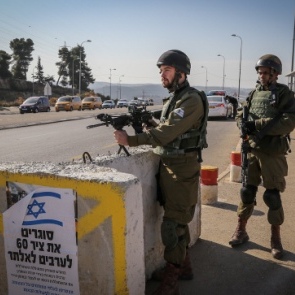
Community

Terror shakes suburban normalcy of Gush Etzion
BEN SALES
ALON SHVUT, West Bank
Pictured: Israeli soldiers guarding a barrier at the Gush Etzion junction, a major transit point for the West Bank, on Monday.
PHOTOGRAPH: GERSHON ELINSON/FLASH90
The barrier is a recent addition to the scenery at the junction, a major transit point for the area, and residents have already adorned it with political art. On one side is a painting of boxy white homes sitting on brown hills with the slogan “Gush Etzion, an Israeli home”. On the other is a poster with bold, black letters reading “Kahane was right”, a reference to Meir Kahane, the extremist rabbi who wanted to expel Palestinians from the West Bank.
The artwork reflects the tension between security and normalcy that is a fact of life for Gush residents.
Gush Etzion, a group of bedroom communities about 30 minutes south of Jerusalem, typically feels much like any other Israeli suburb. But a string of terror attacks in recent weeks has shattered the area’s calm, putting its residents on high alert and prompting calls for an increased military presence here.
Last week Thursday, a Palestinian man opened fire at the junction from a moving vehicle before ramming his car into another car, killing three people, among them an American yeshiva student. On Sunday, a 21-year-old Israeli woman died after sustaining multiple stab wounds. Several other stabbings and attempted stabbings have been reported at the junction in the past month.
“Our neighbourhood looks like Vietnam,” said Rivka Epstein Happin, who lives in this Gush settlement adjacent to the junction, where she led a protest on Monday. “Every day there are more and more soldiers. Once a terrorist gets to our neighbourhood, it’s too late. We need to stop the flow of terrorists in our neighbourhoods.”
Located roughly halfway between Jerusalem and Hebron, the 21 settlements that make up Gush Etzion are home to about 70 000 Jews. The bulk of those residents live in two cities, Efrat and Beitar Illit, the remainder in smaller settlements. The entire area is widely expected to remain part of Israel in any eventual peace agreement.
The first Jews settled in Gush Etzion prior to the establishment of the State of Israel in 1948, but the area fell to the Arabs in the War of Independence. The area was resettled following Israel’s victory in the 1967 Six Day War.
Gush Etzion junction is a major commercial and transit hub for the southern West Bank. Buses pass through en route to Jerusalem and Hebron, while locals often use it as a hitchhiking spot. A strip mall has sprung up on its south-western corner containing a supermarket, cafe, filling station and tyre repair shop.
Many local Palestinians work in Jewish-owned homes and businesses and Palestinians and Israelis shop and work together in the supermarket. Now an armoured vehicle stands in front of the market, which is fenced off from the street, and Palestinian workers have been barred from entering the settlements.
Pairs of soldiers stand at each exit from the roundabout, ready to check passing Palestinian cars. Concrete blocks sit in front of bus stops to guard against attacks by vehicles. Overall, about 20 soldiers now patrol the junction, while the Israeli army is making some 30 arrests per week in nearby Palestinian villages to head off potential attacks.
The area’s seeming normalcy is what makes it such an attractive target, said an Israeli military commander stationed in the area. Beyond killing Israelis, he said, terrorists hoped to turn a tranquil place into a war zone.
“This isn’t just about hurting people’s lives,” said the commander, who asked to remain anonymous per Israel Defence Forces protocol. “It symbolises a fabric of life, and the steps we’re taking, from their perspective, represent a certain kind of success.”
The officer said his goal was to “minimise the friction” in the area, but some residents want the army to go further. At a rally on Monday at the junction, hundreds of women demanded better security measures, with some speakers suggesting closing off the main roads to Palestinians.
“All of the roads of the bloc are roads meant only for Jews,” said Ruti Hasano, a resident of Kiryat Arba, a settlement south of Hebron, whose husband was killed last month when an assailant in a truck hit him. “They paved them for us. Before they paved these roads, [Palestinians] had their own paths. They should return to those paths.”
Shuli Mualem, a parliamentarian from the right-wing Jewish Home party, called on the government to launch a military operation in the West Bank and formally annex Gush Etzion to Israel.
“Arabs have nothing more to do in Gush Etzion,” said Mualem, who lives in the Gush settlement of Neve Daniel. “We’re stepping up the war on terror.”
But other settlers feel that more separation from their neighbours will only make matters worse, further alienating Palestinians and driving more of them to acts of terror.
“We should internalise that in Israel, as long as it exists, Jews will live together with non-Jews – most of whom will be Arabs,” Shalom Arbiv, a doctor who lives in Alon Shvut, wrote on the community’s e-mail list. “We don’t need to turn the other cheek. But we also don’t need to act zealously, to no effect, and to continue poisoning the atmosphere.” (JTA)




